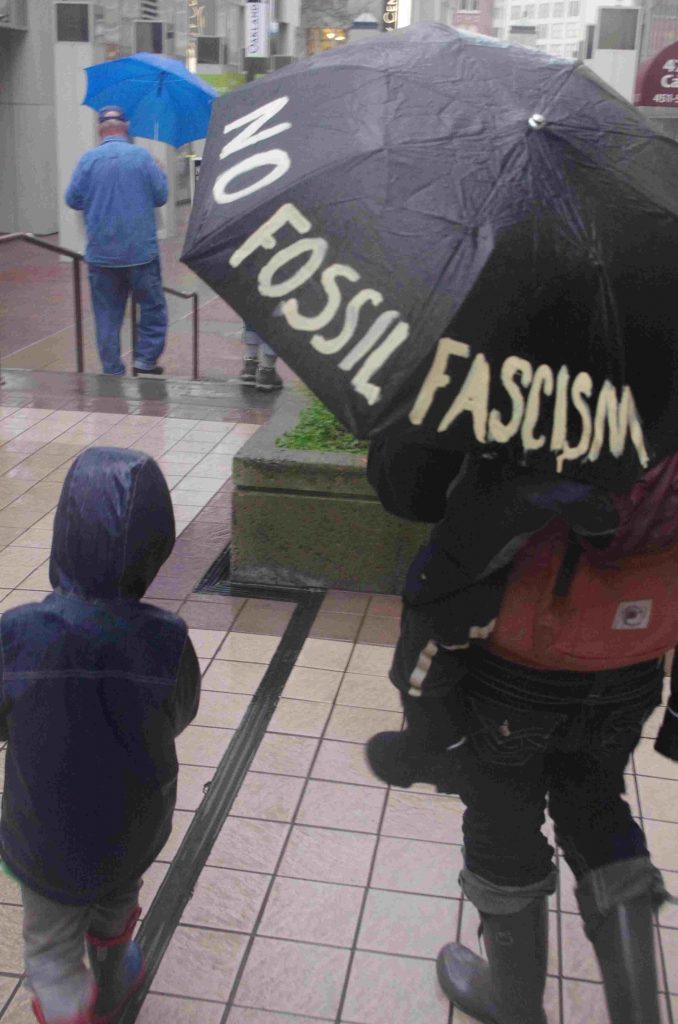By The Zetkin Collective
What happens when the rise of temperatures intersects with the rise of the far right? This latest instalment in the “Political ecologies of the far right” series, based on the new book White Skin, Black Fuel, seeks an answer.
Two trends intersect in the present: rising temperatures and the rise of the far right. What happens when they meet? In their new book, White Skin, Black Fuel: On the Danger of Fossil Fascism, Andreas Malm and the Zetkin Collective have done a first inquiry into this intersection. The book is the product of the two years collective research and writing effort. Mapping thirteen countries across Europe, the US and Brazil, it systematically studies the role of fossil capital and the far right in the climate crisis.
‘Historical verdict in climate case: Shell needs to reduce its CO2 emissions drastically,’ one of the many headlines in the Dutch Media read about the verdict of May 26, 2021, in which the court judged that Shell gets until 2030 to reduce their emissions, not by 20%, as they had planned, but by 45%. On the same day, ExxonMobil lost a few seats at its board to a small climate conscious hedge fund called Engine No. 1, who are pushing the oil giant to draw a better plan to combat climate change. And Chevron, the second-largest US oil producer, received a mandate from shareholders to enact deeper cuts in its CO2 emissions by accounting for its emissions from oil and gas sales, which the company had excluded from its initial plans. Hopeful messages abounded Climate activist Bill McKibben called it a “watershed day”, while Salon wrote: “If any single day can be designated the climate tipping point, that day happened this week.”. It seems we are finally starting to combat climate change. But aren’t we cheering a little early?
While ExxonMobil has lost two seats on its board, it won’t be easy to change the fossil giant’s course. Charlie Penner from Engine No. 1 even mentioned that ‘there is no big change,’ and that ‘nothing is going to happen quickly.’ And while Shell received a command to also reduce third scope emissions resulting from its fossil products, the company has only a so-called ‘obligation to do efforts,’ no obligations to obtain actual results. And lastly, while the court rejected as ultimate nihilism Shell’s trite argument that other companies would dig up the fossils if they weren’t allowed to, , Shell does have a point here. As long as fossil licenses are sold, the question remains if passing the stick around will in fact reduce any emissions at all.
The fossil industry is a colossus, anchored firmly into our world’s economy, with tentacles reaching far into our political systems. As White Skin, Black Fuel states, we are now in a situation in which full breakdown can be averted only by the most herculean redirection and restructuring of that world economy. That this was about to happen, was something that already became clear in the 1980’s, when scientists pointed at the possible disastrous consequences of human-induced climate change. Even the fossil industry knew. Yet, it did what it had in its might to halt the necessary transformation by setting up a denialist ideological state apparatus and raise doubt, in order to save fossil capital and secure business-as-usual. Today, fossil companies continue to spend billions to promote climate denialism and block climate regulations, and the denialist stick seems to have found an ally in an emerging and more dangerous political force: the far right.

Fossil fuel industries don’t just support climate denialism, they also fund white supremacy and far-right politics. Source: Otherwords.org.
On the Danger of Fossil Fascism
While both climate change and the political far right have been studied widely, only few serious attempts have been done to study what happens when they intersect. The Zetkin Collective has done a first systematic inquiry into the rise of the political far right and their reaction to the climatic crisis across Europe, the US and Brazil. And it turns out: all significant European far-right parties have expressed climate denialism. Even though some moved away from it, gravitating more towards a form of green nationalism, denial remains the default position.
Hostile to immigration as the far right is, every time climate change is mentioned, it deflects the issue by making a statement about immigrants. The real danger for them is not climate change, but too many Muslims on our lands. Or as Marine Le Pen once said: ‘Migrants are like wind turbines, everyone agrees to have them but no one wants them in their backyard.’
Whereas the original denialist apparatus declared that ‘the free market is precious, all is well, climate change is not a real problem’ the far right now argues: ‘the nation is precious, it is going under, climate change is a non-problem’. Save the nation, and with it, save the planet. ‘We’ve defended ourselves against Muslim invasion before in the great, great past, and now we will need to do it once again.’ In White Skin, Black Fuel, we call this idea ‘palindefence’, as a variation of the concept of ‘palingenesis’—meaning the rebirth of a nation after a cultural decline—introduced by Roger Griffin, the scholar who devoted his life to study fascism and its many facets. In fact, so we argue, the rise of the far right can actually be understood as a reaction to the climate crisis: the structural forces that thwart the shift towards a sustainable future all gravitate towards the far right.

Protesters outside the Federal Building in Oakland, California, defending the city’s prohibition of coal, and denouncing the climate denialists appointed by then- US president Trump (January 9, 2017). Source: NoCoalinOakland.info
White Skin, Black Fuel raises the question: what will a warmer world look like? Those who have done the least to induce climate change will face the biggest consequences. With inhabitable land and food becoming scarce, we will need to rethink the way we live on this planet. Yet the far-right section of the wealthy white West will most probably do all that is in their might to guard their relatively unaffected soil, their food, and their monetary wealth from being shared with black and Muslim populations.
And while the far right remains greatly in denial of the actual root of the problem, our trees are burning to ashes, the rising sea starts to swallow inhabitable land, rainforests are burning, and the carbon sink that is permafrost is thawing and releasing more greenhouse gasses by each passing month. The question arises if we have already passed a climatic point of no return. We are in a climate crisis.
Researchers who have studied fascism have observed that in order for fascism to become an actual historical force, it requires power and a state of crisis. One only has to look at Germany or Italy at the start of the twentieth century to know what this cocktail can lead to. Fascism, we argue, can be understood as ‘a politics of palingenetic ultranationalism that comes to the fore in a conjuncture of deep crisis’, with support from the dominant class, ensuing ‘an exceptional regime of systematic violence against those identified as enemies of the nation’. One of the most telling examples such of a form of extreme nationalism imagining the rebirth of a nation that has been in decline, might be Trump’s ‘Make America Great Again’.
Today, we are facing a crisis of magnitude. And the far right’s devotion towards the fossil industry will only add fuel to this already existing fire. The only aspect missing seems to be the aspiration to violence against the enemy. Violence, which we argue, one can see hints of in far-right terrorist attacks such as the one in Christchurch (New Zealand) mosques in 2019. It would therefore be legitimate to ask ourselves: are we moving towards a fossil fascist state?
—
Formed around the Human Ecology division in Lund in 2018 to match the far right surge across Europe, the members of the Zetkin Collective—scholars, students, activists and alumni—undertook research in their native language to see what these specific parties and political actors did and said when it came to the environment and climate.
Top (feature) image: Fossil capital is a hydra with many heads. Source: Its Going Down






